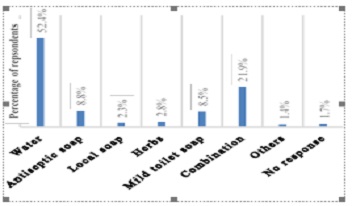Vulvovaginal Care Practices among Patients Presenting to Special Treatment Clinic of a Tertiary Healthcare Facility in Northwest Nigeria
Mots-clés :
Vulvovaginal Care, Special treatment clinicRésumé
Background: To prevent discomfort from vulvovaginal complaints and as a way of maintaining personal hygiene, women use various cleaning agents for vulvovaginal care. Unfortunately, some of these agents are injurious to the vulvovaginal area. The muco-cutaneous inflammation, often caused by their use may cause further discomfort and increase the risk of acquisition of sexually transmitted infections like HIV.
Aim: This study aimed at identifying agents women commonly used for vulvovaginal care with a view of generating public awareness and promoting correct practices thereby reducing risk of acquiring sexually transmitted infections such as HIV, genital chlamydial infection and gonorrhea.
Methodology: It was a cross sectional study involving women who presented to the Special Treatment Clinic (STC) of a tertiary healthcare facility in Northwest Nigeria with vulvovaginal symptoms over a 6-month period were recruited. Structured questionnaire was used to collect data on their socio demographic and bio-medical characteristics, symptoms of vaginitis and various vaginal cleaning agents used. Data was analyzed using SPSS version 20.0 and descriptive statistics documented.
Results: A total of 351 women attending STC were analyzed. Age range was 15- 65years, with mean age of 28.7±8.5. Majority 247(70.1%) were married, 229 (65.2%) were unemployed while 144(41%) had attained tertiary education. The commonest agent used for vulvovaginal care (52.4%) was water only. Other agents identified included antiseptic soap/solution (8.8%), mild toilet soap (8.5%), herbs (2.8%), local soap (2.3%) and 21.9% used a combination of various agents. Educational level was the only factor associated with type of agents used for cleaning (p=0.002).
Conclusion: The high prevalence of use of other agents apart from water underscores the need for creating public awareness about proper vulvovaginal care among young girls and women.

Téléchargements
Publiée
Licence
(c) Copyright O Jimoh, AO Jimoh, J Ejembi, OT Ige, AK Koledade, MS Idris, A Ibrahim, AT Olayinka 2021

Ce travail est disponible sous licence Creative Commons Attribution - Partage dans les Mêmes Conditions 4.0 International.




